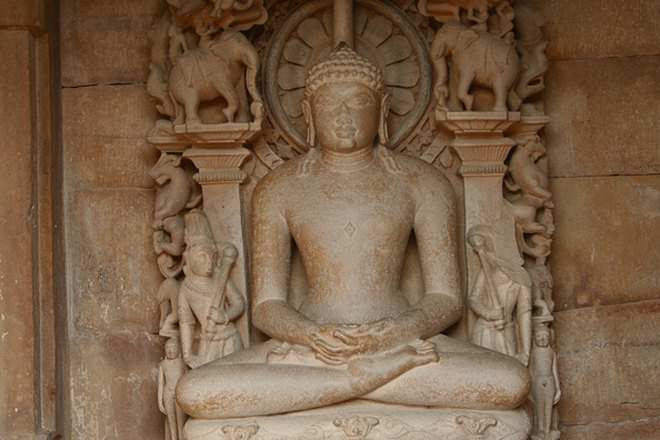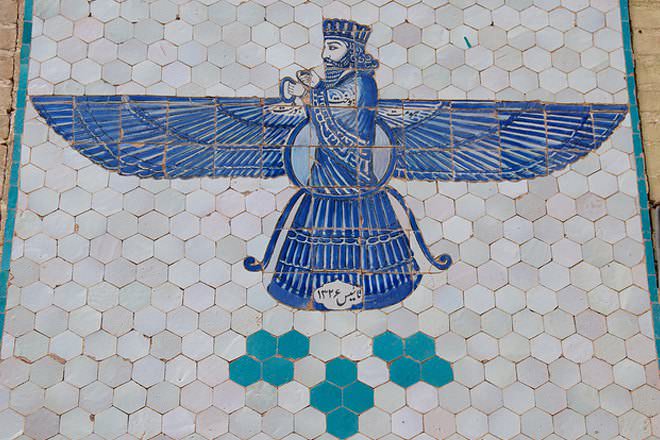|  |  |
| Practices | Five vows of Truth, Non-violence, Non-stealing, Non-attachment, control over desires and senses. Greater emphasis on non-violence and truth. Also follow 3 jewels of Right Perception, Right Knowledge and Right Conduct |
Fire is used in Zoroastrian worship. Zoroastrians also pray 5 times a day. |
|---|
| Place of origin | India. |
Persia (Iran) |
|---|
| Belief of God | Jainism does not believe in a Creator God. |
One God. |
|---|
| Use of statues and pictures | Common. |
Permitted, there are several drawings regarding Prophet Zoroaster and symbolic images of God (Ahura Mazda). |
|---|
| Place of worship | Temple |
Dar-e Mehr (Persian) or Agiyari (Gujarati) or Fire temple |
|---|
| Founder | Rishabhdev- 1st Tirthankar in this era, Further revived by Vardhaman Mahavir- 24th and final Tirthankar of this era |
Zarathustra Haechataspa Spitama or Zoroaster (Greek) or Zartosht (Parsi) |
|---|
| Human Nature | Human suffering is due to negative effects of bad karma and excessive attachment to material aspects of world. |
equal ability to do good or evil. |
|---|
| Literal Meaning | To become a Jina (liberated soul) by following the teachings of 24 Tirthankars (ford-makers/teachers) |
Follower of Zoroaster. |
|---|
| Life after death | Until liberation is achieved, circle of rebirths and deaths continue due to Karma via incarnations in any life form on earth, as also heavenly and hellish life forms. |
Eternal life in Heaven, or in Hell. |
|---|
| Goal of religion | To gain liberation and be released from cycle of rebirths, adopt a path of non-violence towards all living beings. |
To serve God, by good deeds towards others. To acquire and cultivate divine attributes, particularly “ good mind and righteousness; to elevate themselves in harmony with God and to listen to God’s guiding voice within them. |
|---|
| Followers | Jains. |
Zoroastrians. |
|---|
| Means of salvation | Goal is to unshackle the soul from bondages of karma which results in misery due to many rebirths and deaths. Once soul is freed from these bondages, it achieves Nirvana and becomes perfect soul free from all attachments, in an eternal blissful state |
Good thoughts, good words, and good deeds. |
|---|
| Scriptures | Religious scriptures called Agamas. Many other canonical texts. |
The Zend Avesta. |
|---|
| Clergy | Monks, nuns. |
Priests. |
|---|
| View of the Buddha | Buddha is considered as contemporary of Mahavir |
N/A |
|---|
| Status of women | Women can become nuns. |
Equal to men |
|---|
| Geographical distribution and predominance | Mainly in India, lower Asian subcontinent throughout, and America. Small groups exist in most countries. |
Middle East, Central Asia and Northern India. |
|---|
| Principle | Respect all living things. Attain liberation by avoiding and shedding of bad karma which is the cause of rebirths and all sufferings. Five vows and three jewels. |
Good thoughts, good words, and good deeds. |
|---|
| Concept of Deity | Numerous deities known as Tirthenkaras. But Jains do not worship them in literal sense of idol worship to ask favors. Rather, these Tirthankars are venerated as ideal Men and teachers whose teachings should be followed. |
One Good God, Who is in cosmic battle with one evil god. |
|---|
| About | Following the teachings of Mahavira. |
Zoroastrianism is one of the most earliest monotheistic faith, in a concept of the one creator God (Known as Ahura Mazda) |
|---|
| Second coming of Jesus | Jains believe in pluralism, that is, truth has multiple view points. Thus it is accomodating of other religions' views. |
N/A |
|---|
| Definition | Teachings of Tirthankars |
Follower of Zoroaster. |
|---|
| Ressurection of Jesus | NA |
Denied |
|---|
| Abrahamic Lineage | N/A. |
N/A. |
|---|
| Concept of God | No creator God. Rather, Godliness is the inherent quality of any soul characterizing infinite bliss, power, Perfect knowledge and perfect Peace. One who achieves this state by breaking bonds of Karma and liberation from rebirths can be termed God. |
One God |
|---|
| Angels | Concept of Yaksha, Yakshinis. They are celestial and heavenly beings who can aid and guide humans upon invoking. But they are not considered God and their worship is not encouraged as they are not perfect souls and haven't achieved Nirvana. |
Angels serve Ahura Mazda. |
|---|
| View of other Dharmic religions | Comradeship with other Dharmic religions. |
Zoroastrianism was founded in protest of worshipping numerous Aryan/Hindu deities. |
|---|
| Holy days/Official Holidays | Paryushan festival |
Nowruz, Zartusht-no-diso, Jamshid nowruz |
|---|
| Population | 50-60 million |
Approx. 100,000 Zoroastrians in the world. |
|---|
| Time of origin | Very ancient. One of the oldest religions as origin of 1st Tirthankar is too ancient and obscure. Mahavir (24th Tirthankar) born in 599 B.C.E. |
2000 B.C. |
|---|
| Authority of Dalai Lama | N/A. |
N/A. |
|---|
| Place and Time of origin | Unending and un-beginning...it has always existed and will continue to do so. Revived in every time cycle. Very ancient, origin obscure dating many millenia |
Priests |
|---|
| Rites | Generally common. |
Generally common. |
|---|
| Names of God | 24 Tirthankars, besides some celestial beings are worshipped as Demi Gods though they are not liberated from cycle of rebirths. |
Ahura Mazda. |
|---|
| Birth of Jesus | Not relevant |
N/A. They believe that Zarathustra was virgin born. |
|---|
| Identity of Jesus | N/A. |
Denied |
|---|
| Resurrection of Jesus | N/A. |
Denied |
|---|
| Death of Jesus | N/A. |
N/A. |
|---|
| Authority of Pope | Not relevant |
N/A. |
|---|
| View of God | Numerous deities. |
God is All Good. |
|---|
| Clothes | Avoid clothes made from animal products. |
Zoroastrians traditionally wear a sacred thread around their waist, the kusti. Both men and women must cover their heads. |
|---|
| Virtue on which religion is based upon | Ahimsa (meaning non-violence, or pacifism). |
Kindness. |
|---|
| Praying to Saints,Mary, and Angel | N/A. |
N/A. |
|---|
| Introduction (from Wikipedia) | Jainism ( /ˈdʒeɪnɪzəm/; Sanskrit: जैनधर्म - Jainadharma, Tamil: சமணம் - Samaṇam Kannada: ಜೈನ ಧರ್ಮ - Jaina Dharma), is an Indian religion that prescribes a path of non-violence towards all living beings. |
Zoroastrianism /ˌzɒroʊˈæstriənɪzəm/, also called Zarathustraism, Mazdaism and Magianism, is an ancient Iranian religion and a religious philosophy. It was once the state religion of the Achaemenid, Parthian, and Sasanian empires. |
|---|


Comments: Jainism vs Zoroastrianism